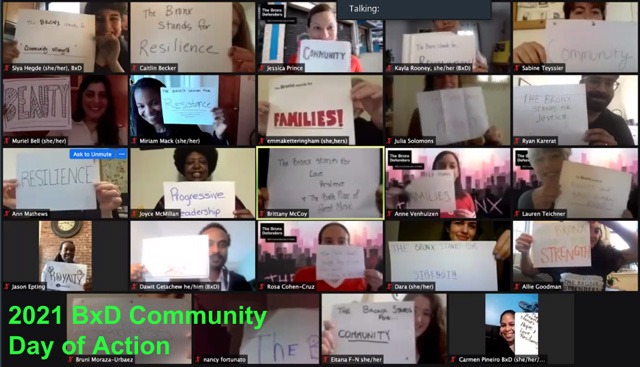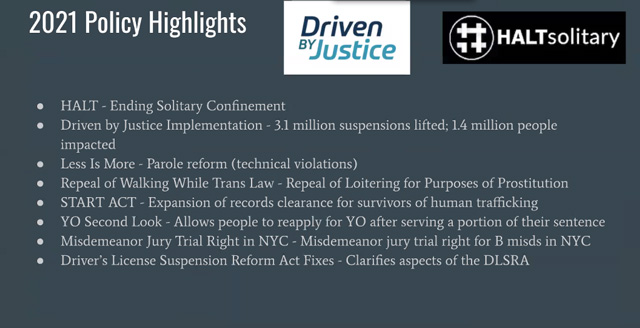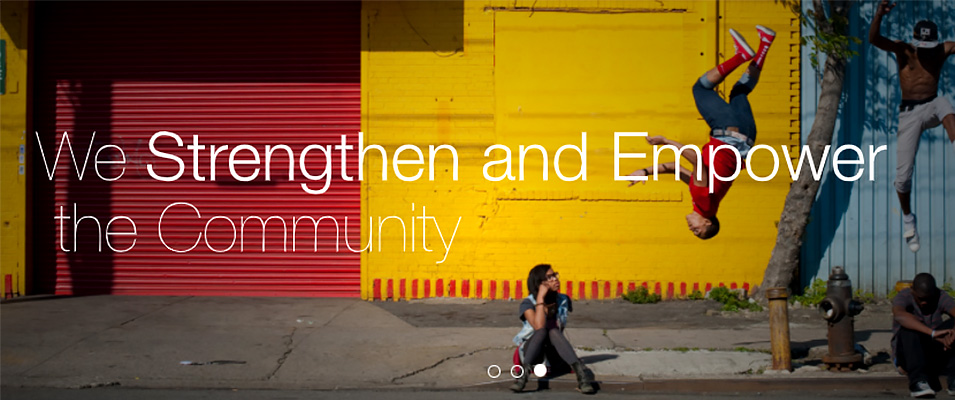
By Adrian Currie
The Bronx Defenders, a nonprofit public defender, held its third Annual Community Policy Summit to brainstorm ideas on organizing to address key concerns. In the virtual meeting held February 1, the group discussed prison reforms, unfair courtroom treatment of minorities, affordable housing programs and bills that support equality inclusiveness of minority populations.
Brittany McCoy opened the meeting with an overview of The Bronx Defenders. “We are a holistic public defender’s office,” said McCoy. “We represent about 20,000 people a year who can’t afford lawyers in a variety of courts.”
Brittany McCoy
Bronx residents and local organizations were present to discuss these issues, as group facilitators encouraged participants to share their thoughts. Shannon Barber, a Bronx Defenders community organizer, detailed more about their organizing and campaign efforts.
“We host and present at community forums and town halls,” said Barber. “We meet with elected officials, provide support and information. We offer Know Your Rights trainings, information, and resources to thousands of Bronx residents and beyond.”
Shannon Barber
The Know Your Rights trainings train people on what to do if stopped by police and their rights as immigrants. They also include what to do in the case of police misconduct, what to do if the Administration for Children’s Services (ACS) knocks at your door, as well as parental, housing, and inmate rights.
The group discussed their opposition to NYC Mayor Eric Adams’ call to enact a “dangerousness provision to New York’s bail statute.” The Bronx Defenders said it would only ensnare more Blacks and Latinos in the criminal justice system. The Bronx Defenders, along with The Legal Aid Society, Brooklyn Defender Services, New York County Defender Services, Queens Defenders, and the Neighborhood Defender Service of Harlem, have come together to petition the mayor’s efforts.
The current bail law, reformed by Albany in 2019, says that in misdemeanors, judges must release the accused on his or her own recognizance or set nonmonetary conditions. Judges can’t set bail with the exceptions of sex-related misdemeanors and a few other charges. Judges also can’t set bail for many non-violent felonies. The Bronx Defenders is rejecting any proposed provisions that would “further imprison New Yorkers who are presumed innocent and have not been convicted of a crime.”
The Bronx Defenders Community Policy Summit also served to train participants to organize, encouraging them to teach others who will in turn teach others to organize, as a mechanism of bringing change to underrepresented communities. Aleciah Anthony, director of community engagement, emphasized the importance of coming together to organize. “I’m talking about building a force to be reckoned with,” said Anthony. “Because when you know how to do organizing, and when we do it together, we build community power. With community power, we can take on any issue.”

Aleciah Anthony
Scott Levy, Bronx Defenders’ chief policy counsel and director of The Bronx Defenders Fundamental Fairness Project, covered some of the group’s legislative victories in Albany, including the implementation of Driven by Justice, the Less Is More Act, and HALT Solitary Confinement Act. “The passage of HALT Solitary Act was a big win, not just for the Bronx but for advocates and impacted people all across the state,” said Levy. “And it was the result of many years of effort.”
Scott Levy
The NYS Senate passed the HALT Solitary Confinement Act in Albany March 18, 2021, limiting the use of “segregated confinement for all incarcerated persons to 15 days.” The bill was sponsored by State Senator Julia Salazar, chair of the Senate Committee on Crime Victims, Crime and Correction. In a statement Salazar said, “The passage of HALT in the Senate brings us one step closer to bringing justice to all those who have lost loved ones to wrongful use of solitary, and the New Yorkers who have been victims of this state-sanctioned torture.”
Other policies highlighted at the Summit include the Repeal of Walking While Trans Law, the START ACT, YO Second Look, Misdemeanor Jury Trial Right in NYC, and the Driver’s License Suspension Reform Act fixes.
Sophia Gurulé, Bronx Defenders policy counsel for immigration practice, highlighted some of the bills the organization is currently working on in New York State, such as the New York for All Act (Senate Bill S3076A) and Dignity Not Detention Act.
“The New York for All Act would basically extend the detainer laws throughout New York State, so that everyone in New York State would have protection from ICE,” said Gurulé.
Sophia Gurulé
Dawit Getachew, member of the criminal defense practice policy team and a Bronx defense attorney, opened his segment with a poll, one of several posted for participants throughout the Summit. “How much does NYC spend per year to incarcerate a single person?” The majority of participants chose the correct response, $438,000. “The city is spending billions of dollars locking people up,” said Getachew, adding that NYC also spends approximately $14 million on policing each year.
“We have jails and prisons that are filled with people who have been over-policed, criminalized for conditions related to homelessness, substance use, and mental health,” said Getachew. “The criminal legal system like the family regulation system and ICE’s deportation machine… are all perpetuating long-term social and economic horror.” Getachew added that most of these are people of color and many have a mental health diagnosis.

Dawit Getachew
Getachew explained that the goal of the policy team is to shrink the scope and impact of NYC’s criminal legal system. “We really believe that public safety doesn’t mean more policing and incarceration,” said Getachew. He said instead the city should invest in things that help communities thrive, such as “better healthcare, better schools, housing, drug treatment programs, and other services.”
Dawit Getachew
Eli Northrop, another member of the policy and defense teams and a Bronx criminal defense attorney, highlighted some of the other policy priorities. They include a Treatment Not Jail Act, which expands the treatment options available to individuals charged with a crime, a Community Not Cages campaign that consists of a bill to eliminate mandatory sentences in the state, a bill to expand the good time and merit time inmates can earn after sentencing, and the Second Look Act. They are also working on the Promoting Pre-Trial Stability Act which would prompt a hearing when the court imposes an order of protection on someone charged with a crime.
Eli Northop
In January, the Defenders demanded that the city stop recording all phone calls made by inmates inside NYC jails, as mistakes have been made by the contractor that manages the calls. A recent audit by the Department of Correction (DOC) and the managing contractor, Securus Technologies, Inc, showed that nearly 2,300 privileged calls between inmates and their defense teams were recorded, according to a release by The Bronx Defenders.
“Thousands of times, the people we serve believed they were having private and legally-protected conversations with their counsel,” said the group. “Thousands of times, DOC and its contractor Securus trampled that right. In some instances, conversations were turned over directly to the prosecutors.”
Siya Hegde, Bronx Defenders Civil Action Practice (CAP) counsel, provided insight on some of the civil matters the organization has worked on since it began 22 years ago. “When we advocate for our clients across various civil venues and forums…we do realize that the simple fallout is far beyond just the timeline or duration of someone’s criminal, family, and immigration cases,” said Hegde. “The consequences are anything but collateral. They are consequential. They are direct. They are incredibly violent and traumatizing and triggering.”
The Civil Action Practice is currently working with NYC’s civil Right to Counsel coalition to expand the current program, giving all New Yorkers the right to counsel in civil matters, such as eviction proceedings, as well as in criminal proceedings. The Bronx Defenders civil practice is also working with the state’s Housing Justice For All coalition to advocate for policies that help New Yorkers with housing concerns.
Siya Hegde
“We’ve had landlords ruthlessly illegally evict tenants all across the Bronx,” said Hegde. “That has been a practice that, although is 100% illegal, has happened more times than I wish I could admit. We’ve had landlords threaten to call ICE because of the fact that tenants are not paying or are withholding rent.” CAP is currently pushing an anti-eviction initiative that would expand the city’s current eviction policies to provide legal representation for tenants facing an eviction.
Hegde also spoke about The Good Cause Eviction Act, which would stop landlords from evicting tenants for no reason and the Clean Slate Act initiative, which would permanently seal a person’s record after a specified period. The Clean Slate bill did not have enough support in the NYS Senate last year, but advocates, including The Bronx Defenders, continue to ramp up the support for it.
Siya Hegde
Participants were sent into breakout rooms for further discussion of their own concerns that included NYS and NYC proposed bills, law enforcement and prison reforms, housing, and other issues they felt were in need of change or addressing. They were encouraged to keep in touch with the Bronx Defenders policy initiatives and to organize and lobby for ongoing and upcoming policy campaigns.



